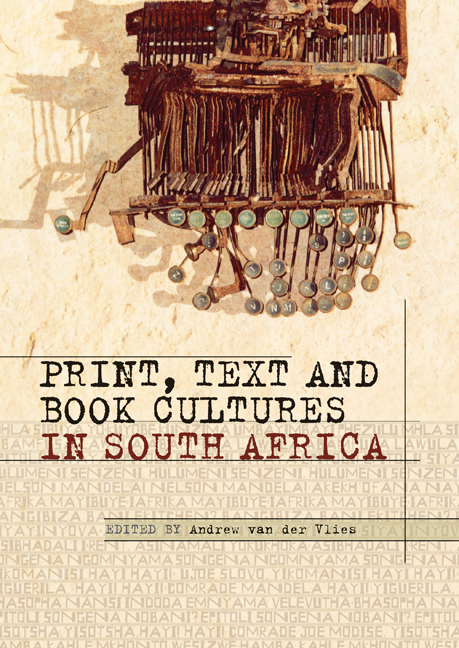Book contents
- Frontmatter
- Contents
- Acknowledgements
- Abbreviations and acronyms
- 1 Introductory
- 2 Print Cultures and Colonial Public Spheres
- 3 Local/Global: South African Writing and Global Imaginaries
- 4 Three Ways of Looking at Coetzee
- 5 Questions of the Archive and the Uses of Books
- 6 Orature, Image, Text
- 6.1 The Image of the Book in Xhosa Oral Poetry
- 6.2 Written Out, Writing In: Orature in the South African Literary|Canon
- 6.3 Not Western: Race, Reading and the South African Photocomic
- 7 Ideological Exigencies and the Fates of Books
- 8 New Directions
- Contributors
- Index
6.2 Written Out, Writing In: Orature in the South African Literary|Canon
from 6 - Orature, Image, Text
Published online by Cambridge University Press: 21 April 2018
- Frontmatter
- Contents
- Acknowledgements
- Abbreviations and acronyms
- 1 Introductory
- 2 Print Cultures and Colonial Public Spheres
- 3 Local/Global: South African Writing and Global Imaginaries
- 4 Three Ways of Looking at Coetzee
- 5 Questions of the Archive and the Uses of Books
- 6 Orature, Image, Text
- 6.1 The Image of the Book in Xhosa Oral Poetry
- 6.2 Written Out, Writing In: Orature in the South African Literary|Canon
- 6.3 Not Western: Race, Reading and the South African Photocomic
- 7 Ideological Exigencies and the Fates of Books
- 8 New Directions
- Contributors
- Index
Summary
South African orature represents “our truly original contribution to world literature”, argues Duncan Brown (1998, 1). This essay explores how orature might be successfully “written into” the South African literary canon, while at the same time acknowledging—and promoting recognition of— its existence as an oral form, and draws on the author's experiences of the difficulties, challenges and benefits of teaching South African orature within the undergraduate English curriculum at a South African university. It takes as its point of departure the question of how to compile a student- and teacherfriendly anthology that would collect, revoice and adequately contextualise a selection of the seminal works of South African oral poets from the colonial to the post-apartheid periods.1 Much of this poetry already exists in print form, but, despite an increasing recognition of oral poetry through a number of endeavours such as the Poetry Africa Festival, the Lentswe Poetry Project on SABC 2, the Timbila Poetry Project and others, South African orature remains marginal in the country's literary canon. It is largely absent from the curriculum in the literature departments of its universities. The need to redress this situation is crucial, but the process of setting up and teaching an undergraduate course in South African oral poetry, while possible, is complicated. The works of our most important oral poets are scattered in a variety of books, libraries and collections. The usual process of drawing up a booklist of set texts is undermined by the stark reality that many of the books are out of print. Fully giving voice to these texts is even harder to achieve— CD and video recordings of performances (if they exist at all) are not easily accessed or disseminated.
How might we redress this situation? Would an anthology be the appropriate medium? My suggestion that South African orature be “written in” to the South African literary canon is not one that can be raised unproblematically. The practices of writing down—collecting, transcribing, translating and transferring oral form into print—have often been critiqued as the means by which oral cultures, in South Africa and elsewhere, have been both distorted and misrepresented.
- Type
- Chapter
- Information
- Print, Text and Book Cultures in South Africa , pp. 306 - 324Publisher: Wits University PressPrint publication year: 2012



